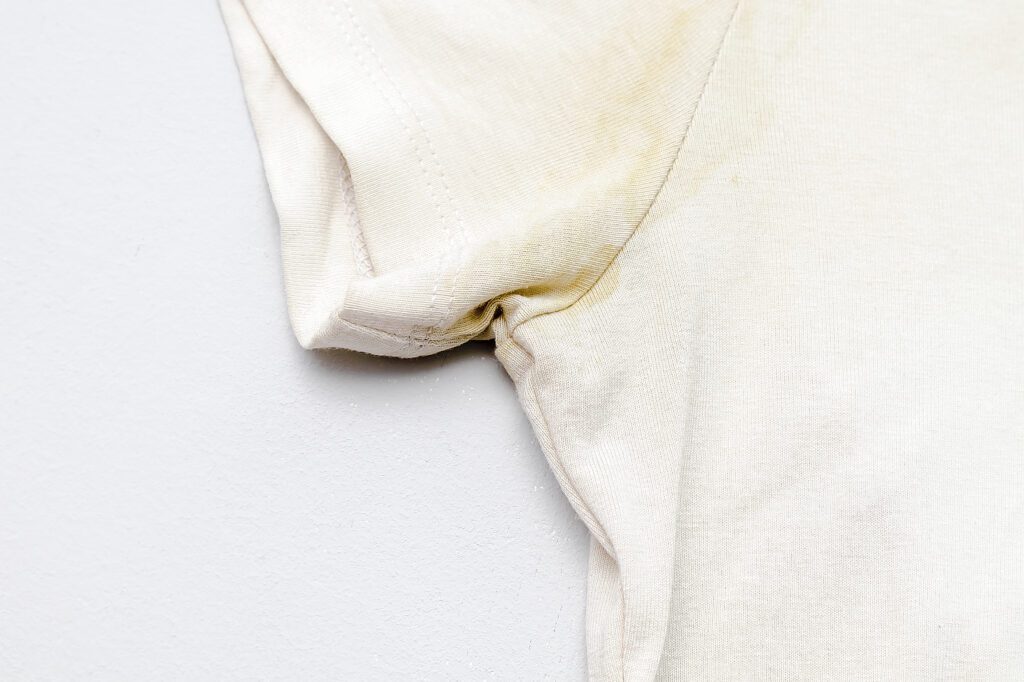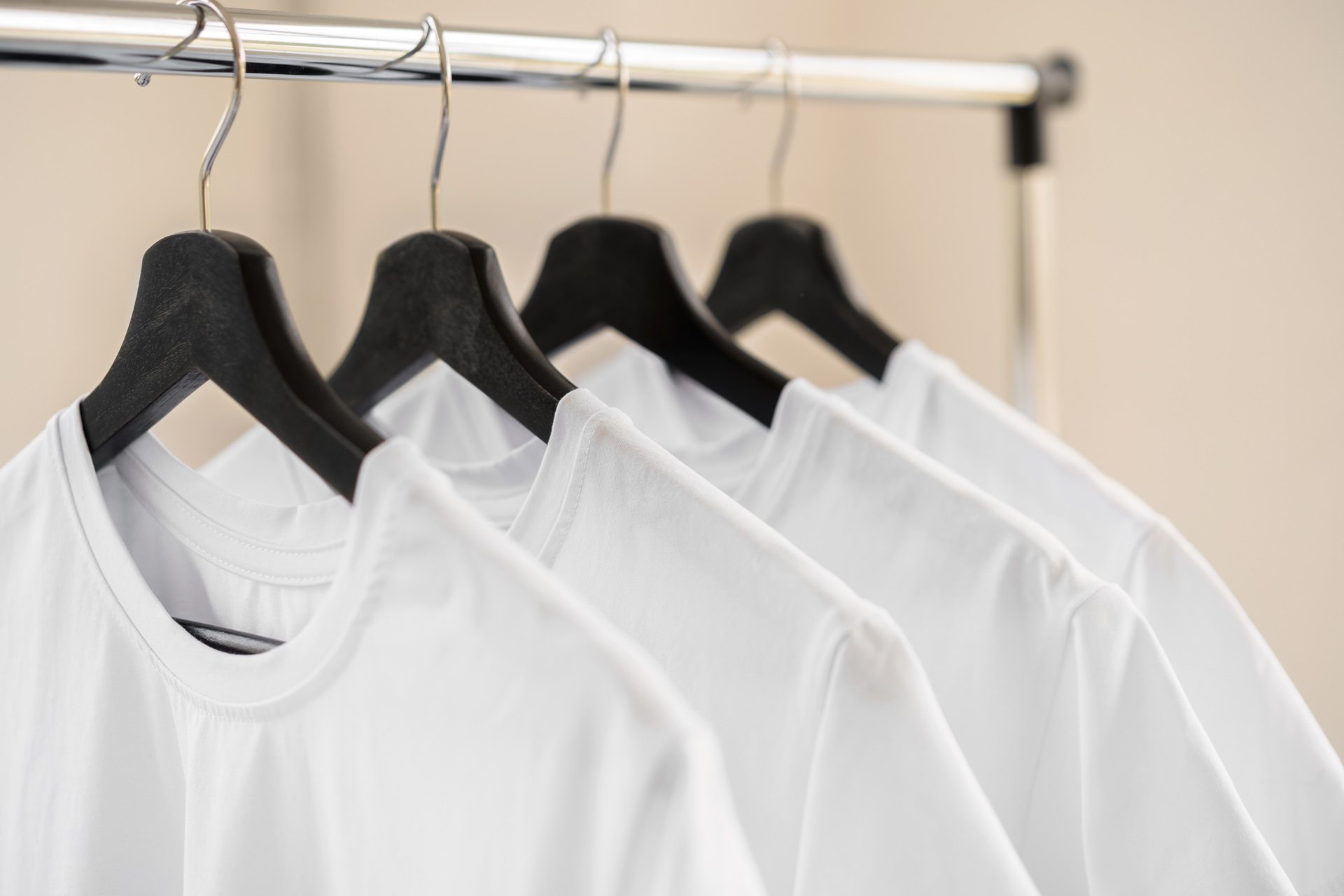It’s not entirely your fault if you have white clothes that eventually become yellow, because so many factors are beyond your control – sweat, body oils, and the minerals in your water all contribute to those frustrating yellow stains. Even the laundry products you use – yes, the very products meant to keep your clothes clean – can leave behind residues that contribute to yellowing over time.
But just because these factors are out of your hands doesn’t mean you’re stuck with dull, yellowed whites forever. The key is understanding what causes the yellowing and knowing how to effectively tackle it. Find out how to whiten your favorite clothing items in the wash using this guide.
Why Do White Clothes Turn Yellow?
There are several reasons white fabrics lose their brilliance over time. It’s not just one thing – it’s a combination of factors that slowly robs your clothes of that crisp, clean look.
Sweat and Body Oils
One of the most common culprits behind yellowing is something we can’t avoid—our own bodies. Sweat and natural oils from our skin seep into fabrics, especially around the collar and underarms. Over time, these areas start to yellow as the oils break down and oxidize, particularly if they’re not washed out thoroughly.
Detergent Residue
Did you know that even the detergent meant to clean your clothes can be part of the problem? If your clothes aren’t thoroughly rinsed, leftover detergent can build up on the fabric, attracting dirt and causing yellowing. This is especially true if you use too much detergent or if you have a washing machine that doesn’t rinse well.
Mineral Deposits from Hard Water
If you live in an area with hard water, like Los Angeles and many parts of California, your water might leave more than just a clean rinse on your clothes. Hard water contains minerals like calcium and magnesium that cling to fabrics, creating a yellow or grayish cast over time.
Overuse of Bleach
It may seem counterintuitive, but using too much bleach can cause your whites to yellow. Bleach is harsh and can break down the fibers in your clothes, making them more prone to yellowing, especially if used frequently or in high concentrations.
Aging Fabrics
Sometimes, the yellowing of white clothes is simply a sign of aging. Over time, the fibers in your garments naturally degrade, especially in fabrics like cotton and linen. This breakdown causes the fabric to take on a yellowish hue, even with regular washing.
Whiten Your Yellowed White Clothes Using These Five Effective Methods

Knowing what causes white clothes to turn yellow is half the battle. The other half? Figuring out how to bring them back to their original, bright state. With these five techniques, some effort, and a little patience, you can bring those whites back to life and make them look as good as new.
1) Baking Soda Soak
Baking soda is a powerhouse for whitening and refreshing your clothes. Its mild alkaline properties help break down dirt and grease, which contribute to yellowing. Baking soda not only whitens but also softens fabrics, making it a gentle yet effective option for delicate items.
How to Use It: Mix one cup of baking soda with four liters of warm water in a large basin or your washing machine. Let your yellowed clothes soak in this solution for several hours or overnight for more stubborn stains. After soaking, wash as usual.
2) Vinegar Rinse
Vinegar is another versatile household item that can help brighten your white clothing pieces. Its acidic nature breaks down mineral deposits and detergent residues that cause yellowing. Vinegar is especially effective for keeping your whites bright without using harsh chemicals.
How to Use It: Add one cup of white vinegar to the rinse cycle of your washing machine. For particularly yellowed areas, you can also pretreat by applying vinegar directly to the fabric and letting it sit for 30 minutes before washing.
3) Lemon Juice and Sunlight
Lemon juice is a natural bleaching agent that, when combined with sunlight, works wonders on yellowed white shirts. This method is perfect for those who prefer an environmentally friendly approach to laundry.
How to Use It: Squeeze the juice of one or two lemons into a basin of hot water. Soak your clothes in this solution for at least an hour, then lay them in the sun to dry. The combination of lemon juice and UV rays from the sun naturally bleaches the fabric, brightening your clothes.
4) Hydrogen Peroxide
Hydrogen peroxide is a powerful bleaching agent that’s safe for most fabrics and is often used by professional laundry services to brighten whites. This method is particularly useful to brighten whites that have yellowed due to sweat and body oils.
How to Use It: Mix a cup of hydrogen peroxide with your regular detergent in the washing machine. For tough stains, apply hydrogen peroxide directly to the fabric before washing.
5) Oxygen Bleach
Oxygen bleach is a safer alternative to chlorine bleach, offering strong whitening power without the harshness that can damage fabrics. It is especially effective for maintaining the brightness of your whites over time, making it a great addition to your regular laundry routine.
How to Use It: Add oxygen bleach to your washing machine according to the package instructions. For heavily yellowed clothes, you might want to soak them in a solution of oxygen bleach and water before washing.
Get Your Whites Back to Bright with The Cleaning Club’s Professional Care!
When you’ve taken care to wash and store your clothes properly and still find them turning an unflattering shade of yellow, what do you do? That’s when you turn to The Cleaning Club! We have a wash and fold service that goes beyond the basics, using advanced cleaning techniques to restore your garments to their original brightness.
And the best part? We offer FREE pickup and delivery to Brentwood, Culver City, Inglewood, Santa Monica, and West Los Angeles in California, so you can enjoy top tier laundry care without leaving your home. There are no hidden fees—just straightforward, reliable service that puts our customers first.
Call us at 213-259-8159 to schedule a pickup!
Frequently Asked Questions
Can I use fabric softener when trying to whiten clothes?
It’s best to avoid using fabric softener when trying to whiten clothes. Fabric softeners can leave a residue on the fabric, which attracts dirt and contributes to yellowing over time. If you prefer softer clothes, consider adding a small amount of white vinegar to the rinse cycle instead. It will soften the fabric without leaving behind the residue commercial fabric softeners can cause.
Is dry cleaning a better option for keeping white clothes white?
Dry cleaning is a good option for certain types of white clothes, especially those made of delicate fabrics that are prone to yellowing, such as silk or lace. The professional solvents used in dry cleaning remove oils and other substances that contribute to yellowing. However, the process can be more expensive than home laundering, so it’s important to weigh the price against the benefits. For everyday items, regular washing with the right products can be just as effective.
How can I prevent yellowing when storing white clothes?
Make sure your clothes are clean and completely dry before putting them away. Store them in a cool, dry place, ideally in a breathable fabric bag rather than plastic, which can trap moisture and cause discoloration. If you’re storing whites for an extended period, consider adding silica gel packets to absorb any excess moisture.
Are commercial laundry products better than homemade solutions for whitening clothes?
Commercial laundry products, such as those specifically formulated for whitening, can be highly effective and convenient. Many of these products contain optical brighteners and other ingredients designed to enhance the appearance of white fabrics. However, homemade solutions such as baking soda, vinegar, and lemon juice are also effective, especially for those who prefer a more natural approach. The choice ultimately depends on your preferences and the specific needs of your clothes.
